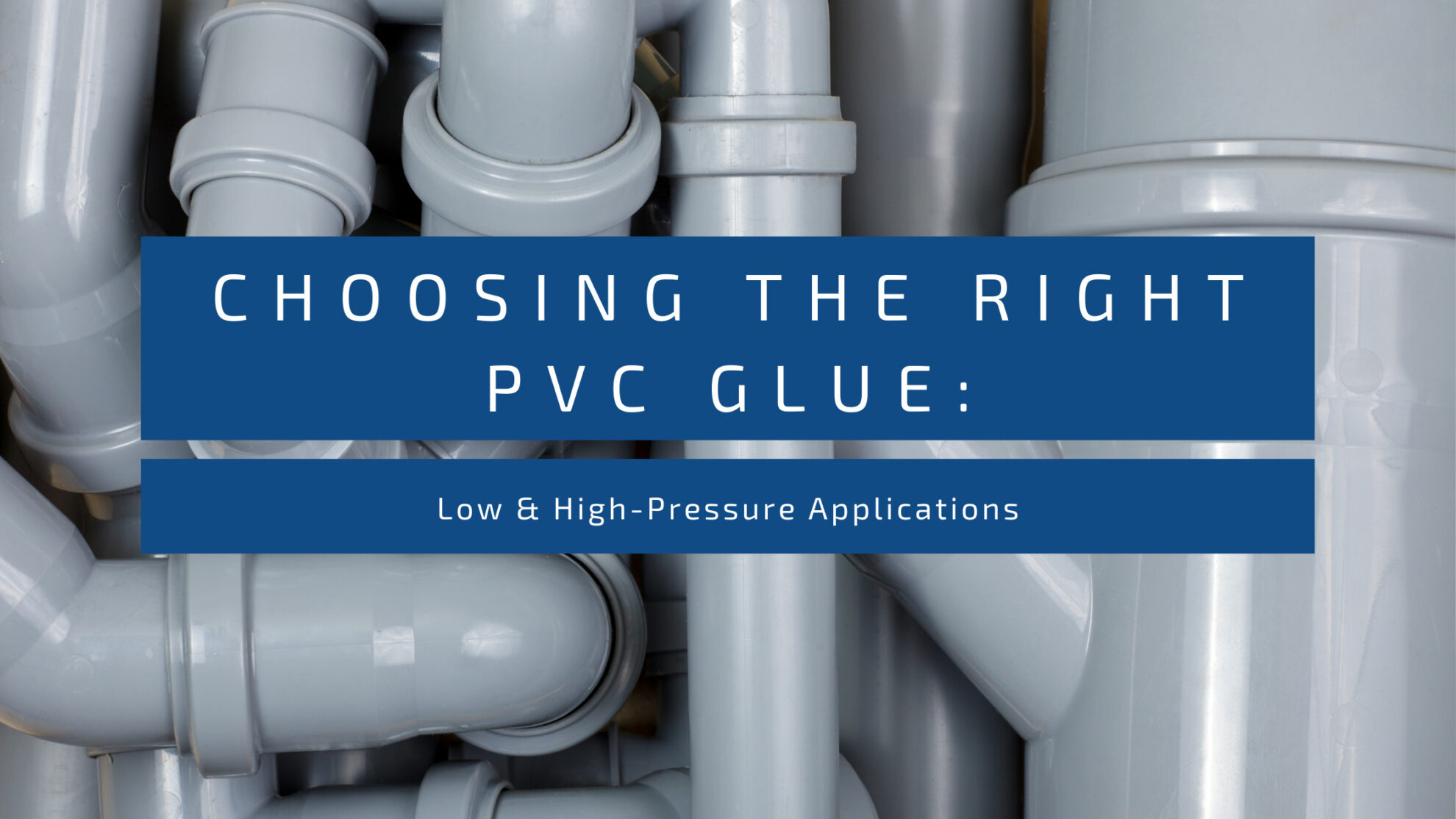
If you’ve identified the culprit of your current plumbing problem, the next challenge is finding the right materials to fix it. For installing and repairing PVC pipes, you’ll typically need the correct type of glue or solvent cement, or the newly mended joint may not stand up to wear and tear.
When choosing the best PVC glue or PVC cement, you should make sure that it is suitable for PVC plumbing pipe. Next, you’ll need the correct type of PVC glue for high-pressure or low-pressure applications. Finally, you will also need to use PVC primer for most high-pressure applications.
To find out more about the types of PVC glue and when to use them, just keep reading! This article covers the essential applications of solvent cement and the best PVC glue for high pressure and low-pressure water flow.
Table of Contents
What is PVC Glue or Solvent Cement?
‘PVC glue’ is also referred to as PVC cement or solvent cement, the official term for the product. There are solvent cements for a wide range of pipe materials, including CPVC, but the substance will only create an effective bond when used on the matching material type.
This is because solvent cement actually breaks down the structure of the pipe itself, melting and then hardening the PVC to chemically ‘weld’ pipes and fittings together. Solvents that effectively soften PVC aren’t effective on CPVC, and vice versa.
What is PVC Glue Used For?
You can use PVC glue for a range of different plumbing applications, including:
- Fixing leaks and filling small gaps
- Joining PVC pipes and fittings
- Temporary PVC repairs
- Permanent PVC repairs
PVC glue comes in a range of varieties to suit different conditions. Each type of PVC glue has a specific use, and it isn’t a good idea to use the wrong PVC cement for your PVC pipe selection, even if it saves you a few dollars. The different types of PVC glue vary in thickness, colour, and how long they take to dry, giving contractors an option for every possible project.
Some household plumbing tasks may be easy even for beginners, but others – like using PVC cement – can be extremely tricky. Solvent cement jointing is an expert-level skill that should only be carried out by professionals.
To safely handle PVC primer and solvents, make sure you are wearing the proper safety equipment, such as eye protection and gloves. You should also know that you need to work very quickly when using PVC primer and high-pressure PVC glue. It is ideal to dry-fit the pipes and fittings before using any PVC cement products.
Types of PVC Glue (PVC Cement)
If you are working on a non-plumbing project or pipes with low water pressure, you can use the thinner types of PVC glue or the Type N Cement, which stands for non-pressure. These are usually the cheapest options.
Do not use this type of glue for PVC pipes where high-pressure water flow passes through. It is not designed to hold up to that amount of pressure, and you will probably end up having to repeat the same repair.
For regular home repairs, the best PVC glue you can use is heavy-bodied cement, also known as Type P cement for pressure applications. These types dry a little slower. It is also good to note that aside from the PVC glue itself, you will also need a PVC primer to prep the pipes for better bonding and joining.
There are also pro-level PVC glue options, recommended for heavy-duty and industrial purposes. These options are the best for extremely high-pressure applications, and you have to be extra careful when using this type of PVC glue.
The biggest thing you need to consider for any plumbing repair is choosing the right type of PVC glue, depending on the pressure rating.
Understanding PVC Glue Pressure Rating
PVC glues and their pressure ratings might sound complex, but it is actually very easy to understand with a bit of background knowledge. Various projects will require a specific PVC glue pressure rating for safe and reliable performance. The first thing you need to understand is that you will need PVC glue with a higher pressure rating if your pipes are under strain.
High-pressure environments aren’t limited to industrial scenarios, either. High-pressure applications include sinks, showers, potable, and running water for your home. Low or non-pressure applications include conduits, drains, sewage, and other pipe applications that don’t require the water to run through a pressure tank or pressure booster.
If you pick up a can of PVC glue, you will notice the pressure rating that is usually written on the label. In addition, you will usually come across pressure ratings, such as 12” pressure or 18” non-pressure. The inches refer to the diameter of the PVC pipe for both pressure and non-pressure applications—and that is how you determine if the PVC glue is suitable for your project.
The PVC pipe itself has a pressure rating, which is usually schedule 40 or schedule 80. Schedule 80 PVC pipes can handle up to 280 psi, but for regular home applications, schedule 40 PVC pipes should do the trick.
When it comes to more challenging applications, it’s not only the water pressure that you need to consider. There are other factors that may stress your pipes, such as:
- Vibration
- Temperature
- Chemicals
To withstand all of the factors that may add stress on your pipes, you will need PVC glue with a higher pressure rating. If that is the case, you will need thicker-bodied PVC glue and ensure you use a primer to achieve the bond strength required. You will also need to make sure that your PVC glue will match the size of the pipe for it to work best.
Best PVC Glue for High Pressure
The best PVC glue for high-pressure applications is Type P PVC Glue. The P stands for pressure, and it means you can use it for high-pressure applications, including potable water. This type of PVC Glue can set very quickly, so if you plan to fix your PVC pipes or install a fitting, you need to make sure you know what you are doing.
Christy’s PVC Pipe Cement is another excellent PVC glue brand that can handle high-pressure applications. They are designed to bond in any type of weather, including wet, dry, and humid seasons. It is an industry standard for permanent fixes and PVC joinery.
This particular brand comes with different pressure ratings, so you can choose between the Red Hot Blue or the Red Hot Green option, depending on your needs. You can use both options for pressure applications, but the Red Hot Blue option has a higher pressure rating, which is more suitable for running water.
You’ll need to use one of Christy’s Heavy or Extra Heavy PVC Cement products for heavy duty and industrial applications.
To find out more about Christy’s PVC cement and which type is best for your project, you can consult the complete Christy’s Solvents Product Guide for all the details.
Best PVC Glue for Low Pressure
For pipes that aren’t under a lot of pressure, you can use any Type N PVC cement brand. They are usually the cheapest options in the store, and their consistency is a little bit thinner than industry-standard Type P PVC glue.
Some people would still use primer for non-pressure applications, but if it is a non-plumbing related project, you may be able to manage without it. People use PVC pipes for other crafts and projects, which is why it’s common to have low-pressure PVC glue.
Alternatives to PVC Glue
The best bonding agent for PVC pipes and fittings is PVC solvent cement, and there are no substitutes that are good enough to replace it, especially for high-pressure applications. However, if you are working with PVC pipes for other DIY home projects that don’t involve water pressure, you probably want to avoid the risks of using solvent cement.
For non-plumbing and non-pressure PVC projects, the next best options are:
- Using push-on fittings that don’t require a bonding agent
- Nuts and bolts
- Superglue or epoxy
Using push-on fittings may work for low-pressure applications, but the latter options are only good for non-plumbing projects, like art pieces.
Can you use CPVC glue for PVC pipes?
Some people may get confused by PVC and CPVC glue. If you are in the store looking for PVC glue, make sure you don’t pick up CPVC glue instead. These two options are totally different, and CPVC glue is not a substitute for PVC glue.
Is PVC primer a substitute for PVC cement?
No, PVC primer is designed to be used before applying solvent cement and allows for a stronger bond to be forged. For that reason, priming fluid is highly recommended for high-pressure applications.
Related Questions
How long should PVC glue dry before pressure?
When using PVC glue or cement, you should always check the label and fact sheet for the particular product you’re using. This is because different pressure ratings and formulations of solvent cement are designed to have different drying and curing times. There are also factors that affect the drying or curing process, such as temperature and humidity. If you live in a cold or humid area, you should allow more time before pressure is applied or use a specialised cold-weather PVC product.
Will PVC cement cure underwater?
Yes, depending on the specific product chosen. Any brand that is fast-acting and advertised as all-weather PVC glue can cure underwater, but it will take at least 24 hours. Be sure to consult the label and fact sheet for the PVC cement you’re using to be certain.
Disclaimer:
This article is published for general informational purposes only and does not constitute professional advice. Any action you take upon the information you find on this website is strictly at your own risk. Always ensure you have the right qualifications and certifications to carry out DIY work and never put your safety at risk. Hills Irrigation recommends consulting a professional for all electrical and plumbing work.

Vince is Managing Director of Hills Irrigation and is supported by Lisa in an administrative capacity. Andrew, Isaac and Megan look after the day to day needs of both online and shop customers. As Project Manager, Vince is also responsible for installation projects along with his team. It is his responsibility to work closely with clients to ensure that scope of work is understood and followed.








